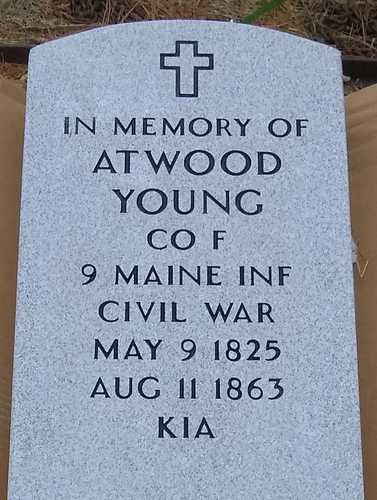Keywords: Civil War stories
Item 28481
Civil War Soldiers' Monument postcard, Bath, ca. 1940
Contributed by: Patten Free Library Date: circa 1940 Location: Bath; Richmond; Frederick City Media: Postcard
Item 75446
Obed Francis Millett, ca. 1860
Contributed by: Palmyra Historical Society Date: circa 1860 Location: Palmyra Media: Photographic print
Exhibit
Field & Homefront: Bethel during the Civil War
Like many towns, Bethel responded to the Civil War by sending many soldiers and those at the homefront sent aid and supported families. The town grew during the war, but suffered after its end.
Exhibit
This Rebellion: Maine and the Civil War
For Mainers like many other people in both the North and the South, the Civil War, which lasted from 1861-1865, had a profound effect on their lives. Letters, artifacts, relics, and other items saved by participants at home and on the battlefield help illuminate the nature of the Civil War experience for Mainers.
Site Page
Maine and the Civil War - Individuals: Stories, Letters, Diaries
"… Individuals: Stories, Letters, Diaries"
Site Page
Cumberland & North Yarmouth - Brothers of the Civil War
"… history of the 11th Maine written after the Civil War tells the story of Luther’s last moments. During the battle at Deep Bottom, in hot, humid…"
Story
Civil War Soldier comes home after 158 years
by Jamison McAlister
Civil War Soldier comes home after 158 years
Story
A Maine Family's story of being Prisoners of War in Manila
by Nicki Griffin
As a child, born after the war, I would hear these stories - glad they were finally written down
Lesson Plan
Longfellow Studies: The Birth of An American Hero in "Paul Revere's Ride"
Grade Level: 9-12
Content Area: English Language Arts, Social Studies
The period of American history just prior to the Civil War required a mythology that would celebrate the strength of the individual, while fostering a sense of Nationalism. Longfellow saw Nationalism as a driving force, particularly important during this period and set out in his poem, "Paul Revere's Ride" to arm the people with the necessary ideology to face the oncoming hardships. "Paul Revere's Ride" was perfectly suited for such an age and is responsible for embedding in the American consciousness a sense of the cultural identity that was born during this defining period in American History.
It is Longfellow's interpretation and not the actual event that became what Dana Gioia terms "a timeless emblem of American courage and independence."
Gioia credits the poem's perseverance to the ease of the poem's presentation and subject matter. "Paul Revere's Ride" takes a complicated historical incident embedded in the politics of Revolutionary America and retells it with narrative clarity, emotional power, and masterful pacing,"(2).
Although there have been several movements to debunk "Paul Revere's Ride," due to its lack of historical accuracy, the poem has remained very much alive in our national consciousness. Warren Harding, president during the fashionable reign of debunk criticism, perhaps said it best when he remarked, "An iconoclastic American said there never was a ride by Paul Revere. Somebody made the ride, and stirred the minutemen in the colonies to fight the battle of Lexington, which was the beginning of independence in the new Republic of America. I love the story of Paul Revere, whether he rode or not" (Fischer 337). Thus, "despite every well-intentioned effort to correct it historically, Revere's story is for all practical purposes the one Longfellow created for him," (Calhoun 261). It was what Paul Revere's Ride came to symbolize that was important, not the actual details of the ride itself.












